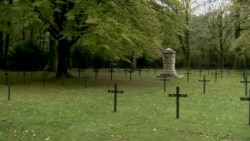At first glance in the dappled forest light, the plateau of Le Chêne Tondu appears as a typical slice of rural France. The woodland tranquillity is occasionally punctured by the sound of hunters targeting the wild boar that roam the Argonne Forest.
But beneath the November carpet of fallen leaves hides a network of German military installations. Man-size craters mark the foxholes and machine gun positions dug as a desperate last defense of the ridge against the oncoming American soldiers. Nearby, a signals bunker is buried under layers of moss, while the trunk of an ancient oak is studded with iron hooks, the remnants of a lookout post.
“The Americans would have been coming up from the other side — the 28th Division, the Pennsylvanians — trying to get a foothold on this plateau,” explained Randy Gaulke, a battlefield guide who has been investigating these scars of war for decades.
At the plateau summit lies the Apremont German Military Cemetery, one of the few surviving wartime graveyards. Exactly 1,111 German soldiers are buried beneath solemn iron crosses — a fraction of the 1.7 million Germans who died fighting in the war.
In villages, towns and cities across Europe, remembrance ceremonies will be held Sunday to mark 100 years since the armistice brought an end to the conflict. But in Germany, there will be no such grand commemorations.
Defeat in 1918 brought about years of economic and political chaos, conditions that would give rise to the darkest period in German history as the Nazi Party came to power in the 1930s.
Many Germans say they reflect instead on the lessons learned from the two world wars, as their country has emerged as a key power at the heart of Europe.
Unlike France, Germany was largely unscathed by the war, professor William Philpott of King's College London explained.
“It didn’t suffer the devastation of aerial bombing, for example, that we see in the Second World War," Philpott said.
In the years following 1918, the victorious powers attempted to negotiate peace treaties to stabilize Europe, redrawing the map where empires once ruled.
“The settlements that follow the war leave issues, legacies, that will underpin essentially the outbreak of World War II. Particularly in eastern Europe, where you’ve lost the three powerful empires — the Romanovs in Russia, the Habsburgs in Austria-Hungary and the Hohenzollerns in Prussia. And you’ve created a number of smaller, rather fragile, protoliberal, but essentially not liberal states, out of those places. And the same thing happens in the Middle East with the collapse of the Ottoman Empire,” Philpott said.
Under the peace treaties, Germany was forced to pay huge reparations, its colonies were confiscated, and its territory divided. Philpott said resentment among the population created fertile ground for the rise of Adolf Hitler.
“When the Nazis came to power, (they) repudiated the disarmament clauses of the Versailles Treaty, stopped paying the reparations to France. And in some ways, Germany demonstrated that as a large nation in the center of Europe with lots of natural resources and a large population, she could rise again," he added.
Defeat in 1945 came at a higher cost than in 1918, with the destruction of swaths of Germany’s industrial heartlands. German historian Markus Klauer said the country was able to turn the destruction to its advantage.
“We had the chance to rebuild everything from scratch. So, in the 1960s and '70s, we had the great advantage to have a powerful industry once more. And then we took profit from this peacetime and the geopolitical situation Germany was embedded in. And in addition to this, it also had the geographical position that facilitated Germany’s development," Klauer said.
Economically and politically, Germany emerged as the driving force behind European integration, Philpott said.
“The international institutions created since the 1950s which have led to the European Union, have allowed Germany to exercise influence, financial power, economic strength, in a much more benign way than Germany was able to do before that," he added.
Klauer is more succinct.
“We learned the lessons out of these two world wars — that no nation in Europe can stand alone,” he said.





